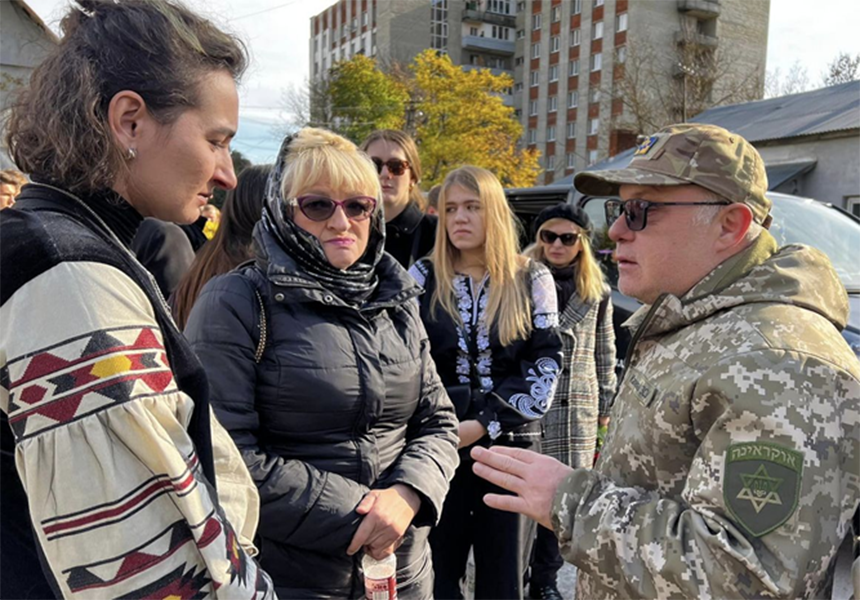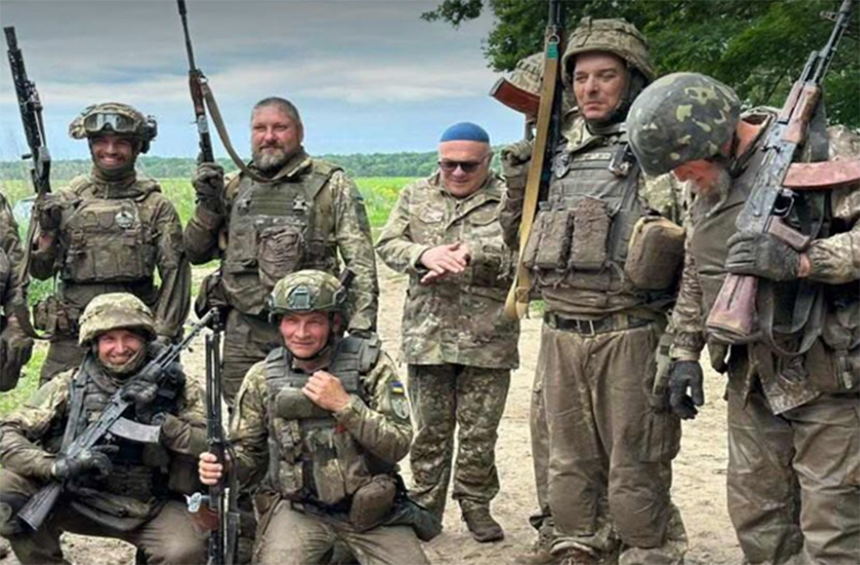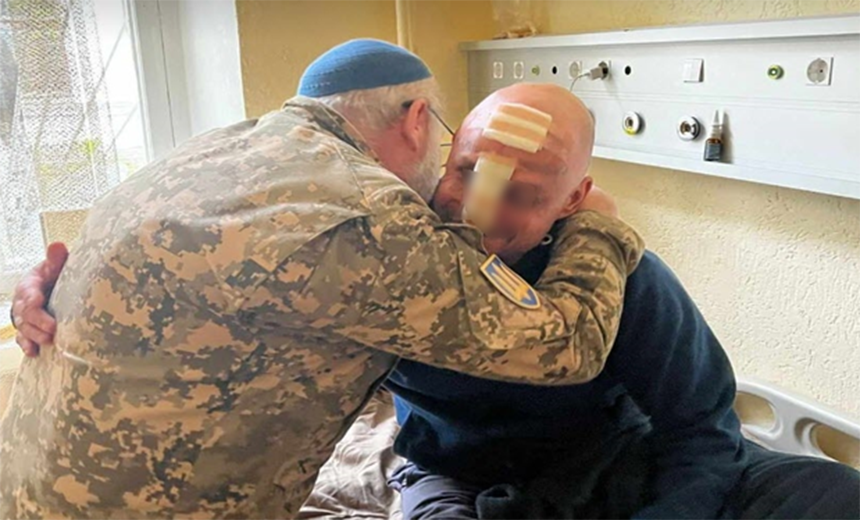The first Jewish chaplain of the Ukrainian army

David Milman of the Brodsky Central Synagogue in Kyiv became the first official Jewish military chaplain in the history of Ukraine. The first and so far the only one in the ranks of the Armed Forces of Ukraine.
The following is David Milman's first-person account of his work.
"My main job is communicating with soldiers, sometimes with their wives and children. Visiting the wounded in the hospitals and assisting them, as well as searching for the missing. The missing are those whose bodies have not been found and who are on the list of prisoners of war. There are Jews among them.
I visit the wounded in the hospitals, bringing them kosher food and tefillin. Here in the photo is Gena from Netanya, whose parents live in the USA and Australia. He fought in the Zaporizhia region. Gena lost his legs and suffered injuries to his face and eyes. Nevertheless, Gena is not sad or depressed. He has many plans for life.
I visited Ruslan in the hospital, too. He lost his foot in the mines of Donbas.
I think about 300–400 Jews in total serve in the Ukrainian army; that is the ones who know and consider themselves Jews. But many do not advertise their Jewishness and usually know little about it. And there are many more soldiers who have Jewish ancestors.
We brought several people into Abraham's union: we did Brit Mila for the soldiers. A real miracle happened to one Jew from London. He is a sapper instructor who came to help Ukraine. He and his partner were driving in a car, and they ran over a mine. The partner and the car are gone, but he is whole and almost unharmed. He says that he escaped because he put on tefillin that morning".
Regardless of faith
"Are there positive moments in my service? I worked with Ukrainian soldiers on rotation from the frontlines. A donor came to them and offered to buy them tactical sneakers. They told him that we also have a chaplain with us who has now gone to the headquarters, but he also needs the shoes. When I returned, they gave me the sneakers. I walk in them, and I'm proud.
As a chaplain, I deal with all soldiers regardless of faith.
The point is the communication. People are on the front lines. Everyone is under stress. Someone's wife has left him, someone else has a conflict with their parents, and so on. And they are all armed. You have to talk to them. Most do not want to talk to the psychologists; there is no such tradition in Ukraine. Besides, the psychologist has to report to the commander, and I don't. With me, it's simpler: we run together, shoot guns at the range; I'm one of them.
According to the law, the chaplain does not carry a weapon.

We are currently preparing for the Jewish soldiers to celebrate Rosh Hashanah [Jewish New Year.—Sh. B.] and Yom Kippur [Day of Atonement.—Sh. B.] in September 2023. We also provided all Jewish soldiers with matzah on the Passover holiday. And now we turn to the commanders; we ask that they be allowed to go to the synagogue on Shabbat.
The procedure is as follows: a soldier has to approach his commander or a chaplain and let them know that he is a Jew. After that, everything is simple. As chaplain of the General Staff, I can even insist that a person be released on Shabbat or a Jewish holiday. Everything depends on the soldier.", — David Milman finishes his story.
The smell of grief
Putin's propaganda speaks of the "de-Nazification" of Ukraine. But in reality, Russian aggression may lead to an almost complete "de-Jewishization" or "De-Judaization" of Ukraine, bringing the end to the physical presence of the Jewish population on Ukrainian lands in any significant numbers.
The first months of the war led to the devastation of Jewish communities. In many cities, 50% to 80 % of local Jews left or fled outside Ukraine. Even on major Jewish holidays, the largest synagogues have a maximum of 20–30 % of worshippers compared to the pre-war level.
The economic foundations of Jewish community life have been undermined — many donors to Jewish projects have been ruined or suffered huge losses. Only the Jewish communities of Lviv and Chernivtsi grew due to the influx of Jewish refugees from the east of Ukraine.
Entire groups of Jews from the cities of Ukraine still live in temporary accommodations in Hungary with the support of international Jewish organizations. A large stream of Jewish war refugees rushed to Israel, but many others decided to go to Germany and will most likely remain there.
Others, however, such as, for example, the Jewish school and orphanage from Odesa led by Rabbi Avraham Wolf, have come back from Germany to their home city. They are now together with other residents of Odesa living under Russian Army rocket attacks, which are deliberately targeting the residential areas of the city.
...In the first month after the Russian invasion, one of the Ukrainian rabbis described to me how 300 Jewish seniors were being evacuated from Chernihiv under the bombs of Putin's "liberators." It was late in the evening, and the people who had just been saved from shelling were stationed for the night right in the prayer hall of the large synagogue.
"These old people did not leave their basements for almost a month. In cold weather, without regular food, with broken sewers and without fresh water supply, without the opportunity to wash for weeks, in fear and uncertainty under the bombs. Can you imagine the smell in that hall in which these unfortunate people have finally found shelter?"—said the rabbi bitterly.
It was the smell of Jewish grief, one of many pieces in the mosaic of Ukraine's suffering. The smell of a man-made tragedy created on the orders from Moscow.
The smell that the Ukrainian rabbis sensed while helping and saving their fellow citizens, both Jews and non-Jews.
The smell of Jewish grief in Ukraine which is not sensed and experienced as a personal life experience by those rabbis of Russia who have chosen the path of collaboration with the Putin regime.
Text: Shimon Briman (Israel).
Photos: David Milman (Ukraine).




















